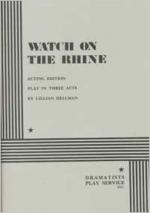|
This section contains 3,594 words (approx. 9 pages at 400 words per page) |

|
In the following essay, the author discusses Hellman's Watch on the Rhine as a mature depiction of an historical era, detailing the threat of war and larger ethical questions through its focus on one family.
Watch on the Rhine , which opened 1 April 1941, was a call to arms to the American public, who, Hellman felt, were too complacent about the menace of Fascism, which she had experienced firsthand in the Spanish civil war. Like Bertolt Brecht, Mark Estrin notes, Hellman "expects her audience to be enraged enough by the injustice she dramatizes to leave the theatre and take social action." As might be expected, the play did not generate an immediate reversal of American political policy, but it did have an impact on American thinking as an influential work rallying support for the allies. In October 1941 the Free World Association broadcast the play in German via shortwave to...
|
This section contains 3,594 words (approx. 9 pages at 400 words per page) |

|




